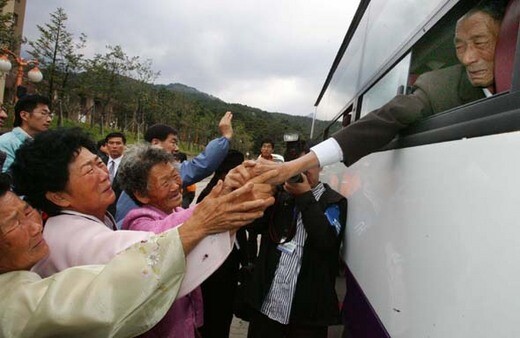hankyoreh
Links to other country sites 다른 나라 사이트 링크
Impasse in inter-Korean relations creates uncertainty about family reunions

Despite a sense of urgency for aged families who have been separated for more than a half century since the 1950-53 Korean War, there remains a great deal of uncertainty about whether family reunions between South and North Korea can be held in the first half of this year. Inter-Korean talks have virtually been halted since South Korea’s December presidential election and, accordingly, no discussions have been held on the issue of family reunions. “While North and South Korea have groped for a solution that they can’t see, there have been no visible results,” a South Korean Red Cross official said.
The two Koreas had originally planned to complete construction of a permanent center for family reunions at North Korea’s scenic Mount Geumgang resort by April, but the completion date has been postponed to August. While officials at the Ministry of Unification and the Red Cross say that the August deadline was the original, many experts say the postponement may be linked to the more subdued state of inter-Korean relations after the South’s president, Lee Myung-bak, who has promised a tougher stance in dealing North Korea, was inaugurated in February.
At the second inter-Korean summit in October, held between then South Korean President Roh Moo-hyun and North Korean leader Kim Jong-il, the two sides agreed to continue family reunions permanently. A month later, at a meeting facilitated by the Red Cross, the two sides agreed to increase the number of family members who would be allowed to meet their relatives across the divided border to 400 people a year.
However, the schedule for family reunions has been disrupted since the inauguration of the South’s new administration. “To reunite 400 family members a year, in line with last year’s agreement, there should be bimonthly reunions held from April to October,” the South Korean Red Cross official said. “At this stage, I’m unable to predict when the reunions will continue.”
The South Korean government is currently believed to be exploring ways to hold talks with North Korea. A senior South Korean government official, who made a recent visit to Washington, said, “If North Korea were to ask, South Korea could provide humanitarian aid after holding inter-Korean talks.” The remark was seen as a proactive gesture toward North Korea.
Up to this point, South Korea has tacitly sent rice and fertilizer to North Korea in return for the North’s consent to hold the family reunions. Since 2000, the South has provided 400,000 tons of rice and 300,000-400,000 tons of fertilizer to the North. In exchange, North Korea allowed the family reunions. The recent move by the South’s new administration is encouraging.
But recent developments in inter-Korean relations is raising doubts about whether reunions can be held in the first half of this year. Generally, it takes some two months to prepare for the family reunions, with preparations including selecting who will meet, identifying whether their family members are alive and exchanging a list of the family members involved.
If South and North Korea were to come to an agreement on holding the family reunions today, the earliest reunions could be held would be late Mary or early June. Unless inter-Korean relations get back on track, reunions cannot be held this year.
As of December 31, 126,787 people were registered as being part of separated families in South Korea.
Please direct questions or comments to [englishhani@hani.co.kr]
Editorial・opinion
![[Column] Park Geun-hye déjà vu in Yoon Suk-yeol [Column] Park Geun-hye déjà vu in Yoon Suk-yeol](https://flexible.img.hani.co.kr/flexible/normal/500/300/imgdb/original/2024/0424/651713945113788.jpg) [Column] Park Geun-hye déjà vu in Yoon Suk-yeol
[Column] Park Geun-hye déjà vu in Yoon Suk-yeol![[Editorial] New weight of N. Korea’s nuclear threats makes dialogue all the more urgent [Editorial] New weight of N. Korea’s nuclear threats makes dialogue all the more urgent](https://flexible.img.hani.co.kr/flexible/normal/500/300/imgdb/original/2024/0424/7317139454662664.jpg) [Editorial] New weight of N. Korea’s nuclear threats makes dialogue all the more urgent
[Editorial] New weight of N. Korea’s nuclear threats makes dialogue all the more urgent- [Guest essay] The real reason Korea’s new right wants to dub Rhee a founding father
- [Column] ‘Choson’: Is it time we start referring to N. Korea in its own terms?
- [Editorial] Japan’s rewriting of history with Korea has gone too far
- [Column] The president’s questionable capacity for dialogue
- [Column] Are chaebol firms just pizza pies for families to divvy up as they please?
- [Column] Has Korea, too, crossed the Rubicon on China?
- [Correspondent’s column] In Japan’s alliance with US, echoes of its past alliances with UK
- [Editorial] Does Yoon think the Korean public is wrong?
Most viewed articles
- 1[Column] Park Geun-hye déjà vu in Yoon Suk-yeol
- 2N. Korean hackers breached 10 defense contractors in South for months, police say
- 3Will NewJeans end up collateral damage in internal feud at K-pop juggernaut Hybe?
- 4[Cine feature] A new shift in the Korean film investment and distribution market
- 5[Editorial] Japan’s rewriting of history with Korea has gone too far
- 6[Column] ‘Choson’: Is it time we start referring to N. Korea in its own terms?
- 7Kim Jong-un expressed ‘satisfaction’ with nuclear counterstrike drill directed at South
- 8[Editorial] New weight of N. Korea’s nuclear threats makes dialogue all the more urgent
- 9[Column] The clock is ticking for Korea’s first lady
- 10Senior doctors cut hours, prepare to resign as government refuses to scrap medical reform plan